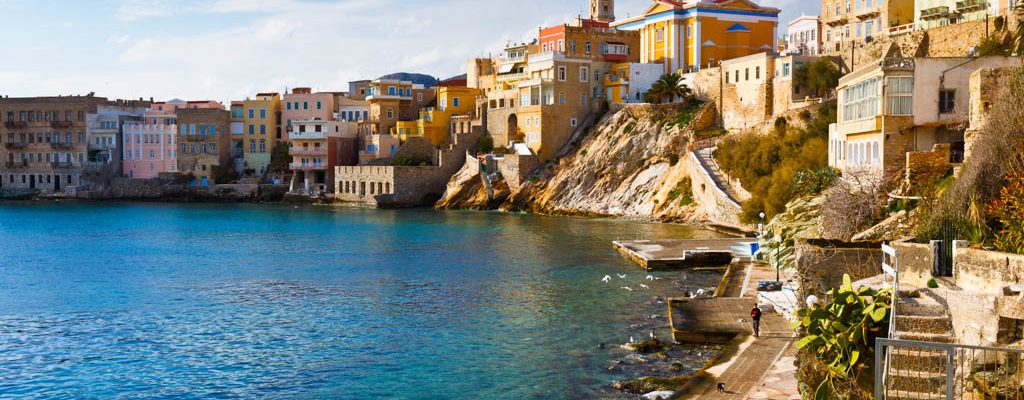For the discerning traveler, Syros is an extraordinary destination. The island offers an intriguing mix of the rugged landscape of the Cycladic Islands and the refinement of Neoclassical architecture – truly a marvel.
Syros- a Special History
From the time of the 4th Crusade, Syros was in the hands of the Venetians. Catholicism came to the island, and has stayed- there is still a large Catholic minority on Syros. During Ottoman rule, the Catholics of the island were under the protection of the Pope. The island enjoyed a degree of autonomy.

During the Greek War of Independence, many refugees fled from other islands such as Chios, Spetses and Kasos, and from Asia Minor from Smyrna and Aivali. They brought culture and prosperity – shipowners among them, and it was this new population who built Ermoupoli, the capital of Syros and indeed of the whole Cyclades.
Ermoupoli – a Stylish City
The town took shape over the 19th century, with affluence and taste. In 1828, Ermoupoli was one of the largest and most important urban centers of the new Greek state. Merchants, bankers, shipowners and industrialists filled the city. Textiles, leatherworks, and iron were all important industries. Moreover, the fist shipyard of Greece – Neorion – was located here. In 1856, the Greek Steamship Company was founded, connecting Syros with Europe and the Middle East and the first such company in Greece. By 1860, this was the most important commercial harbor in Greece. The city prospered, and it looked the part. Neoclassical mansions fill the town, and there are also many significant architectural and cultural landmarks.
The Apollo Theater

With the wealth of Syros also came culture. In 1862, construction of the glorious Apollo Theater began. This opera house – inspired by La Scala in Milan – was designed by Pietro Sampo. It’s a splendid space, with three tiers of loges. Its elaborate painted ceiling suits the space ideally. Depicting composers and poets it is actually a later work, although in a historically correct style, carried out by Dimitris Fortsas during the theater’s restoration.
The City Hall of Ermoupoli
 This magnificent building- one of the largest City halls of Greece, is the work of the famed Neoclassical architect Ernst Ziller, who is responsible for many fine buildings in Athens as well (such as the Illiou Melathron – once the home of the archaeologist H. Schliemann and now the Numismatic Museum). The town hall features a covered atrium surrounded by a loggia and with a black and white checkered floor- one of the most photographed buildings of Syros.
This magnificent building- one of the largest City halls of Greece, is the work of the famed Neoclassical architect Ernst Ziller, who is responsible for many fine buildings in Athens as well (such as the Illiou Melathron – once the home of the archaeologist H. Schliemann and now the Numismatic Museum). The town hall features a covered atrium surrounded by a loggia and with a black and white checkered floor- one of the most photographed buildings of Syros.
The Velissaropoulos Building
This work of the early 1870s by the architect Ioannis Vlysidis is also known as the Cycladic Workers and Employees Center. Constructed entirely of marble, it also ranks as one of the most impressive buildings on the island.
 Ermoupoli’s Magnificent Mansions
Ermoupoli’s Magnificent Mansions
Even the more modest upper-middle-class homes of Ermoupoli have a Neoclassical grace. They are rich in thoughtful details – carved wooden doors, elaborate masonry, balconies with decorative iron railing, and even painted ceilings featuring narrative scenes such as equestrian figures, portraits, botanical motifs, or trompe l’oeil skies.
Nikolaos Prassakakis Mansion
Designed by the German architect Johann Erlacher and completed in 1836, this is one of the earliest Neoclassical buildings in Greece. The vast interior spaces feature beautiful ceiling paintings and a grand marble staircase. The building is now the Chamber of Commerce of the Cyclades. Prassakakis served as mayor of Ermoupoli for two terms.
Konstantinos Tsiropinas Mansion
Tsiropinas, who also served as mayor (1887-1895), was originally from Chios. The mansion is distinguished by a monumental gateway, Corinthian columns, and statues of female figures. It was completed in 1884 and now serves as the Prefecture.
Ermoupoli Today
The aristocratic feel of Ermoupoli, with its pastel Neoclassical mansions and its grand landmark buildings, make this a unique destination. Culture continues to flourish here, with everything from performances at the restored Apollon Theater to the Aegean Festival and an annual international animation festival.





